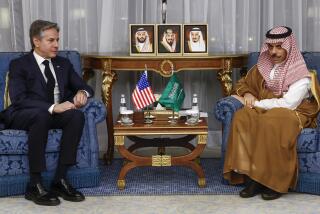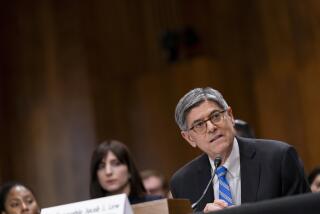U.S. to Step Up Diplomacy in Mideast, Shultz Declares
WASHINGTON — Secretary of State George P. Shultz, responding to Egyptian President Hosni Mubarak’s complaint that U.S. policy in the Mideast has become “almost defeatist,” announced Friday that a high-level U.S. envoy will visit the region later this month to find ways to keep up “the momentum for peace.”
In his first full-scale Washington press conference in almost a year, Shultz also described Mikhail S. Gorbachev as a “businesslike” leader whose selection as head of the Soviet Communist Party provides a rare “moment of opportunity” for improved Washington-Moscow relations.
Implicitly contradicting Mubarak and other Mideast leaders who have complained that the United States has failed to play its customary role as mediator between Israel and its Arab neighbors, Shultz said: “We have a very active diplomacy in the field. I think it fair to say that there has been movement among the parties in the region which we have encouraged.”
Shultz said Richard W. Murphy, assistant secretary of state for Near Eastern and South Asian affairs, will soon visit Israel, Jordan, Egypt, Saudi Arabia and possibly other countries to “do everything that we can to keep the momentum toward peace in the Middle East going.”
Murphy last visited the Mideast in December, with stops in Saudi Arabia, Israel and Lebanon, in an effort to help negotiate the withdrawal of Israeli troops from Lebanon.
Shultz declined to comment on the merits of Mubarak’s call for the United States to open a dialogue with a joint Jordanian-Palestinian delegation. “President Mubarak’s suggestion is one suggestion; there are a number of others,” the secretary said. However, he praised Mubarak for helping to get the peace process off dead center.
Shultz talked to reporters after briefing President Reagan on the meeting he and Vice President George Bush held with Gorbachev in Moscow after the funeral for Soviet President Konstantin U. Chernenko. The secretary said the new Kremlin leader was “well-informed, well-prepared; he gets right at the issues.”
Carefully avoiding the rancorous rhetoric that has often marked the Reagan Administration’s approach to Moscow in the past, Shultz said, “Our two governments have an opportunity for a high-level dialogue to deal with specific problems and to achieve concrete results.”
Short of Endorsement
Nevertheless, the secretary stopped short of endorsing British Prime Minister Margaret Thatcher’s often-quoted comment that “you can do business” with Gorbachev.
“Whether it turns out you can do business is another matter,” Shultz said. “It is one thing to be businesslike, but then we have to try the substance of the issues and see where we can go on it.”
Shultz said Reagan “is prepared to work at it (U.S.-Soviet relations) in a constructive vein. So we have two businesslike people. . . . Whether anything can come of it remains to be seen. But I think there is an important responsibility on both sides to make every effort to take advantage of this moment of opportunity.”
In reference to a possible Reagan-Gorbachev summit meeting, Shultz said, “I think the President would be glad to see Mr. Gorbachev in the United States at his convenience.”
Nevertheless, Shultz said he does not expect to see Soviet policy change sharply because of the new Kremlin leader. He said the United States should “proceed with a sense of realism.”
Gorbachev Presided
Specifically, Shultz said he does not expect any change in the Soviet position at the Geneva arms control negotiations. He pointed out that the leader of the Soviet delegation, Viktor P. Karpov, has said Gorbachev presided at the meeting, held a few days before Chernenko’s death, at which the Soviet negotiating strategy was formulated.
As for Soviet arms programs, including deployment of SS-20 intermediate-range nuclear missiles aimed at Western Europe, Shultz said, “Unfortunately, it is business as usual.”
Shultz also said the United States does not intend to close its embassy in Beirut despite the troubled situation in the Lebanese capital, which resulted in the evacuation of 18 U.S. diplomats Thursday. He said fewer diplomats are needed under present conditions.
“Obviously, the security situation is a tense one for everybody, not just for Americans,” Shultz said. “However, we don’t intend to be pushed out of the region by terrorist threats. At the same time, there is no point in having more people than you need in a situation where there is danger.”
More to Read
Sign up for Essential California
The most important California stories and recommendations in your inbox every morning.
You may occasionally receive promotional content from the Los Angeles Times.










